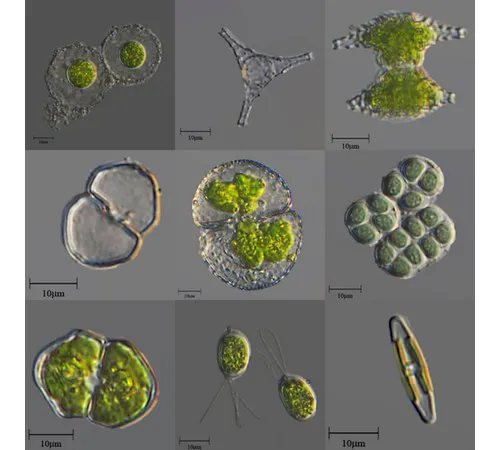Intra Hydropure is used for the removal of biofilm and elimination of harmful bacteria and fungi in irrigation systems. In greenhouses, algae form another group of organisms that can rapidly multiply and cause different problems like water discoloration, impairing the functioning of irrigation systems, and clogging of drippers. Algae may undesirably flourish in hydroponic crop culture practices such as deep water cultivation and nutrient film technique (NFT) systems. Other areas that often encounter problems with algae are ponds, heat exchangers, piping lines, surfaces, etc. Algae growth reduces water oxygen levels, inhibits root growth, competes with plants for fertilizer, and may even be toxic to seedlings.
Since algae formation is always associated with water or wet surfaces, treated water will run off to the surface water or will be disposed to the wastewater treatment station. Therefore, the environmental impact of a treatment approach is very important. This whitepaper explains that Intra Hydropure is a safe and effective preventive method against algae.

Gerwen Lammers, PhD

Carly Vulders, BSc
The world of algae
Algae are a very diverse group of photosynthetic eukaryotes, living in sea- and freshwater and on moist land. In aquatic ecosystems, algae and plankton form the basis of the food chain, and many larger algae species are used for human consumption, utilities, or other applications. Their size may range from microscopic unicellular to multicellular filaments (Figure 1), ribbons, plates, and giant kelps with a length of more than 80 meters. Based on their pigmentation, algae can be divided into seven major classes:
1. Blue-green (cyanobacteria)
2. Freshwater green algae
3. Golden-brown algae, including the diatoms
4. Brown algae like the seaweeds found on rocky shores
5. Red algae from warmer seas
6. Single-celled desmids and dinoflagellates forming marine plankton
7. Yellow-green algae

Figure 1: Microscopical images to illustrate the variety of different types of freshwater algae (By Alexander Klepnev – Own Work, CC by 4.0)
Restrictions for the use of traditional algicides
Algicides have to come in contact with and enter algal cells to be effective in controlling or reducing the growth of unwanted algae. However, due to their ability to reproduce quickly, long-term control of algae may be difficult. The use of traditional algicides may result in restrictions on water use after application. Products can have their limitations in frequency and maximum rate of application, leave residues, and there may be a potential impact on sensitive, nontarget species. However, Intra Hydropure is a unique silver-stabilized disinfectant based on hydrogen peroxide that slowly decomposes after reaction in natural water and oxygen, thus leaving no residues and being compatible with organic farming.
Algae reduction with Intra Hydropure
The most common algae in greenhouses are of the blue-green type, producing an oily blackish-green slimy layer on surfaces. In order to demonstrate the practical efficacy of Intra Hydropure, natural blue-green algae were grown in a freshwater solution under constant aeration and light. The algae solution was equally divided into five laboratory tubes, and Intra Hydropure was added in a final concentration of 0, 10, 25, 50, and 100 ppm. The tubes were incubated under equal conditions for the duration of 24 hours, and the end situation was photographed (Figure 2). The tube without Intra Hydropure (0 ppm) still had the green appearance of the original solution, while the green intensity decreased with increasing concentrations of Intra Hydropure. At 100 ppm, the green color had practically disappeared, indicating full algae elimination within 24 hours in this laboratory experiment. In practice, Intra Hydropure is dosed continuously instead of 24 hours in irrigation systems at a concentration of 40 ppm, which with this prolonged contact time will also result in full algae reduction.

Figure 2: Incubation of blue-green algae with up to 100 ppm Intra Hydropure for 24 hours resulted in the visual elimination of the algae.
Conclusion
The results in this whitepaper demonstrate that Intra Hydropure is an effective algicide. The continuous use of Intra Hydropure starting as low as 10 ppm showed an effective reduction in algae growth. This means that the typical continuous and safe use of 40 ppm Intra Hydropure in irrigation systems is not only effective in biofilm prevention and microbiological control but also prevents algae formation. Intra Hydro-pure is suitable for organic farming. After the reaction, it slowly decomposes in natural water and oxygen, leaving no residues. Therefore, Intra Hydropure poses a safe and effective alternative to traditional algae control products.
For more information:
Intrahorti
Voltaweg 4
5466 AZ Veghel
Netherlands
T +31 (0)413 354 105
F +31 (0)413 362 324
info@intracare.nl
www.intrahorti.nl
